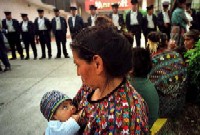Twenty-fourth Sunday in Ordinary Time (Year B)
Fr. Mike Gilgannon
September 13, 2015
Isaiah 50:4-9; Psalm 116:1-2,3-4,5-6,8-9; James 2:14-18; Mark 8:27-35
Fr. Mike Gilgannon, a priest with the Kansas City-St. Joseph diocese who served alongside many Maryknollers in the Andean region, wrote the following reflection which was published in A Maryknoll Liturgical Year: Reflections on the Readings for Year B, available from Orbis Books.
“Put up or shut up.” “Does she walk the talk.” Daily we use the phrases. Is there sincerity in our speech? Do we follow through with what we say?
We all know what St. James goes on to teach in the second reading. Is the Judeo-Christian tradition of faith a litany of verbal values that move us at the hearing? Or do they challenge us, our church and our society, so that we prefer to leave them for saints and prophets to fulfill while we make our daily accommodations to the messy reality around us?
In the first reading Isaiah describes this cost of raising a prophetic voice among the Jews 700 years before Jesus. He laments and fears the anguish of speaking out in public and calling his Jewish people to be faithful to their God. But he also believes that if he is faithful, his God will be with him.
In Mark’s Gospel Jesus spells out the cost of discipleship. “The Son of Man must undergo great suffering, and be rejected by the elders, the chief priests, and the scribes, and be killed, and after three days rise again.”
But then Peter rebuked him – the practical, prudent fisherman, a man not unlike ourselves. We can imagine the conversation, “Jesus, look at the crowds before us. People like you. The poor like what you are saying. We are really getting popular. Why shake people up with that stuff about the cross?” But Jesus replies “Get behind me, Satan! For you are setting your mind not on divine things but on human things … If any want to become my followers, let them deny themselves and take up their cross and follow me.”
To many North Americans these words of Jesus are praiseworthy but far from our lives. Yes, we will suffer when the cable network goes on the fritz or when the freezer unit in the fridge goes down and leaves us a pile of soggy pizzas and TV dinners to throw out. But do we link the words of Jesus to real life sufferings of real people who have lost their jobs or who have to immigrate because they have lost their lands?
The struggles for freedom and equality we lived with those who are poor in the Latin America missions brought home to us the insistence of Jesus on the Cross. There is no resurrection without dying. Historical investigations are now showing us the suffering of millions in Latin America in those dark times. The genocide of thousands of native peoples in Guatemala under a tyrannical military dictatorship. The death and disappearance of thousands more in Argentina, Chile, Brazil, Bolivia, and almost all the countries of Central America. To our shame many of those who supported and even applauded these atrocities were trained or supplied, often illegally, by our U.S. government (think of the “Contras” and the Iran-Contra scandal of the 1980s).
The story of Moses and the Jewish people struggling to be free from their slavery in Egypt became a model of faith and liberation for the peoples of Latin America. That is the Passover story which we Christians continue as the Easter story of Jesus. Only a Cross accepted through love can bring us to the fullness of our human life and destiny.
But the cost of discipleship is still the same as Jesus described it. Prophets and martyrs are not special people. Think of Archbishop Romero in El Salvador, and the Maryknoll women missioners in the same country. Or Luis Espinal, SJ, assassinated in Bolivia. They are just ordinary peaceful people who walk the talk no matter what the consequences.
U.S. society, with its divisions and conflicts of race and class, needs prophets and martyrs today. It needs those who are not afraid to speak out, and act out, of the values of justice and peace. On immigration. On workers’ rights. On prison reform. On voter registration for people who are poor and for ethnic groups. These are never merely “political” issues. They are ethical challenges about human values, which need debate and dialogue — a dialogue that many thoughtful and prayerful Catholics cannot avoid because silence and inaction give “democratic” consent to whatever unjust laws are made.

